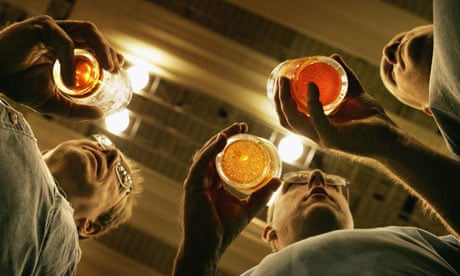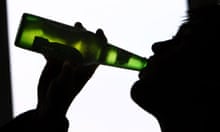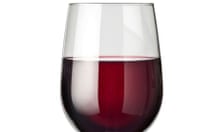Far more Britons consume dangerous levels of alcohol than previously thought, with many women's drinking habits very similar to men's, research suggests.
The two main official surveys of drinking patterns seriously underestimate true intake because they rely on participants' own assessments of how much they drink, which account for only 60% of the total amount of alcohol actually consumed, according to researchers at University College London (UCL).
If the other 40% – what the academics call "missing" alcohol – is included, the number of people consuming more than the government-backed safe drinking limits rises significantly.
If under-reporting of alcohol is taken into account, then average consumption turns out to be 20.5 units a week for over-16s across the UK rather than the 12.3 units depicted by existing surveys.
Therefore as many as 75% of men and 80% of women sometimes exceed the daily limit of three to four units of alcohol for men and two to three units for women – many more than the 56% and 54% reported in the Health Survey for England 2008, according to Sadie Boniface, the lead author, who works in UCL's department of epidemiology and public health.
Similarly, the proportions who exceed the weekly consumption limits, of 21 units for men and 14 units for women, are found to be 44% of men and 31% of women; in 2008, 29% of men and 20% of women told the General Lifestyle Survey they did so.
Most dramatically, the analysis found about half of men and women should be classed as "binge drinkers" because they consume more than the Department of Health's definition of that category, which is more than eight units in a single drinking session for men and six units for women.
Women, especially those on high incomes and those living in the south of England, are most likely to be binge drinkers, the study says, as are high earners generally and also those in deprived areas, for reasons that are not understood.
Sir Richard Thompson, president of the Royal College of Physicians, which represents hospital doctors, said the study "contradicts the claims of the alcohol industry that only a small minority drink too much, and is yet more evidence of the need for strong government action, including a minimum unit price for alcohol".
Diane Abbott, the shadow public health minister, demanded tougher government action on alcohol to reduce what she said was the £21bn annual cost of problem drinking. "We need to see huge change in our hospitals and high streets: nothing short of a political and cultural earthquake," she said.
The chief medical officers from the four home nations are currently looking into official guidelines on alcohol consumption, which have been criticised by doctors and an influential House of Lords committee.
A health department spokesperson said: "We already know people underestimate what they drink, and many drink too much. That's why we work to help people make healthier decisions, including the recent Change For Life campaign to help them track consumption and understand the impact on their health.
"We are tackling excessive drinking through our proposed minimum unit price, at 45p per unit, tougher licensing laws, more GP risk assessments, better access to specialist nurses, and more specialised treatment."





Comments (…)
Sign in or create your Guardian account to join the discussion